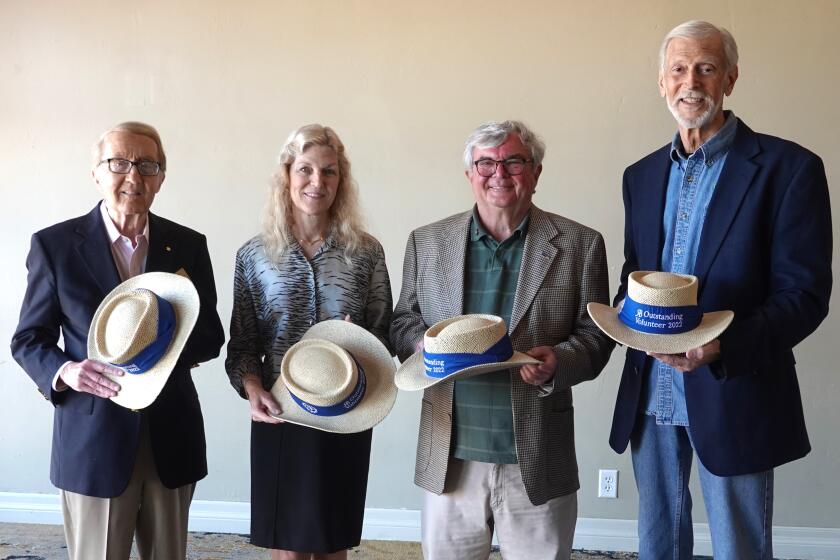Volunteers needed to help during traumatic situations
If you are compassionate and level-headed during times of crisis, Trauma Intervention Programs of San Diego would like you to consider becoming one of its volunteers.
The volunteers are on-call for at least three 12-hour shifts per month, available to provide a comforting presence and practical information to locals experiencing an emotional crisis or tragedy, such as the death of a loved one, in the initial hours before other family or friends can arrive to assist.
TIP is holding its next eight-session training academy from Oct. 13 to 22 at Poway Fire Station No. 1, 13050 Community Road. For the dates and times, go to tinyurl.com/TIP-Poway16. Participants must be available to attend all eight sessions. The follow-up three-month field training will be on Jan. 22 and volunteers meet for three hours each month for continuing education classes.
Those interested but not sure if they are well-suited for the program are welcome to attend the 6 to 9:30 p.m. Thursday, Oct. 13 orientation. There is a $45 academy registration fee, which is returned if after orientation the prospective volunteer decides to not go forward with the training, said Rosanna Corral, TIP’s director of marketing and communications.
Those unable to participate in the Poway training next month can opt for training sessions next February — location to be determined — and May in East County.
For the past 31 years, TIP has worked with law enforcement and fire agencies, including San Diego County Sheriff’s Department and Poway Fire Department, plus local medical centers, including Pomerado Hospital, Corral said.
She said North Inland volunteers are dispatched to help those in Poway, 4S Ranch, Ramona (all served by the Sheriff’s department) and other nearby communities served by its contract partners. In most cases this does not include communities within the City of San Diego, such as Rancho Bernardo, since the city does not have a contract with TIP.
Volunteers mostly stay within their region, but if there is a high volume of calls, they may be dispatched to other parts of the county. There are around 100 volunteers in the program, Corral said.
“The volunteers drop everything to be there for a stranger,” Corral said, adding their calls can be as short as 15 minutes to up to 12 hours. The average call is two or three hours. Volunteers pick their shifts and debriefing is offered to help them deal with their emotions after being out on call.
She said there are a variety of situations in which a TIP volunteer may be summoned. For example, when a person dies at home, morticians — not paramedics — remove the body. “Most people do not plan for death, so we give them a couple of resources,” she said. Among the most heartbreaking, Corral added, is when a baby dies from sudden infant death syndrome.
“Dealing with children’s deaths are the most difficult,” said Rancho Bernardan Linda Wolfgram, a TIP volunteer for 2 1/2 years.
Volunteers do not give death notifications, but are sometimes present when law enforcement does it. Sometimes they assist the grieving person locate phone numbers of those they need to contact.
Volunteers also help comfort witnesses to accidents, especially those present during a suicide — such as one involving a train and pedestrian, Corral said.
Volunteers might also sit by someone’s side while a loved-one is undergoing surgery or help when people lose all their possessions in a fire.
Wolfgram is a nurse, but said volunteers do not need to have a medical background.
“It sounded very interesting and I wanted to give to my community,” Wolfgram said when asked why she volunteered for TIP. “The training was very good and I felt prepared.”
She added, “It’s a wonderful feeling, an honor, to be a part of someone’s life on what could be their worst day. To be a part of that and help in some small way is very humbling. We are taught ways to help, (sometimes) just being there and not having to talk, but just touching them on the shoulder. You’d be surprised at the things people say really helped.”
Wolfgram said sometimes she suggests things that — due to the stressful circumstances — people don’t think of doing. For example, when she visited the home of a young adult who died, she noticed the family was religious so she suggested they call their priest. Another time there was a death and she suggested the parents tell their children’s teachers what happened so they would know the youngsters were grieving when they returned to school.
Wolfgram said she believes each volunteer is sent to a particular call for a reason. “We have a saying that the people who belong on a call are there,” she said.
As for Wolfgram’s advice to potential TIP volunteers she said, “Try it or you’ll never know how extremely rewarding it is to help people. It’s the most rewarding thing I’ve ever done.”
Corral described the ideal TIP volunteer as someone who is compassionate, willing to listen, humble and a person who cares for and about people.
Due to the high-sensitivity of their work, volunteers must be at least 16 years old (those under 21 are typically sent to help at schools and never go on a call alone), have a clean criminal history and driving record, current auto insurance, a cell phone they can use during their shift and regular access to the internet.
Volunteers with a trained comfort dog — such as through Love on a Leash — can also have their dog be certified as a TIP comfort dog. “Our dogs are a great addition to being emotional support on a traumatic call, especially with children,” Corral said.
For more information, go to TIPSanDiego.org.





